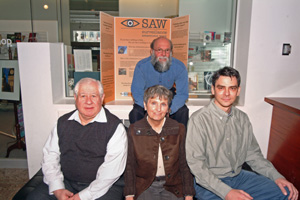Queen's-led Surveillance Project awarded $2+ million Major Collaborative Research Initiative grant from the Social Sciences and Humanities Research Council of Canada (SSHRC).
Tuesday February 26, 2008
Determining how and why everyday people are being watched by public and private organizations - and the social consequences of this expanding surveillance - will be the focus of a new $2.5-million collaborative research project based at Queen's.
Called The New Transparency: Surveillance and Social Sorting, the project was announced today as a Major Collaborative Research Initiative supported by a grant from the Social Sciences and Humanities Research Council of Canada (SSHRC). The Queen's initiative will be led by Sociology professor David Lyon, director of the university's internationally renowned, multidisciplinary research group, the Surveillance Project.
"Under David Lyon's leadership, the Surveillance Project has become one of the most influential and innovative scholarly initiatives on surveillance," says Vice-Principal (Research) Kerry Rowe. "The distinguished track record of David's research will enable this new MCRI project to 'hit the ground running' and confirm Canada's leadership role in international surveillance work."
The "New Transparency" makes visible the identities of individuals, the workings of institutions and flows of information in ways never before seen, explains Dr. Lyon. "Surveillance - the social process underlying the new transparency - is rapidly becoming the dominant organizing practice of our late modern world," he notes. "Heightened public concern about security, plus growing computer-dependence and reliance on the collection of personal information by a variety of institutions, has made surveillance an everyday reality."
The new project will examine the history, key characteristics and consequences of the New Transparency. Among areas of focus are the role of technology companies in fostering surveillance; digital media including networking sites like Facebook; post-9/11 developments including profiling and surveillance at mega-events like the Olympics; population management surveillance in conflict zones such as Israel/Palestine; and challenges and resistance to inappropriate surveillance.
Co-applicants from Queen's are professors Elia Zureik and Laureen Snider (Sociology) and Art Cockfield (Law). Also on the team are Kirstie Ball (The Open University, UK), Colin Bennett (University of Victoria), Andrew Clement (University of Toronto) and Kevin Haggerty (University of Alberta). Researchers from across Canada and a number of other countries will collaborate on the project, while representatives from industry and government will act in an advisory capacity.
"The Social Sciences and Humanities Research Council funds research that builds understanding of complex issues that affect our society," says SSHRC President Chad Gaffield. "The MCRI program supports leading-edge interdisciplinary research and fosters international collaboration, strengthening Canada's leadership role in global research."
Spanning seven years, SSHRC's MCRI grants are designed to contribute to deeper understanding of people and society, while also providing graduate students with opportunities for research training.
Contact:
Nancy Dorrance, nancy.dorrance@queensu.ca, 613-533-2869, or Molly Kehoe, molly.kehoe@queensu.ca, 613-533-2877, Queen's News & Media Services
Read the press release from the University of Victoria here
Read the press release from the University of Toronto here
Read the press release from the University of Alberta here
Read the press release from the Open University (UK) here